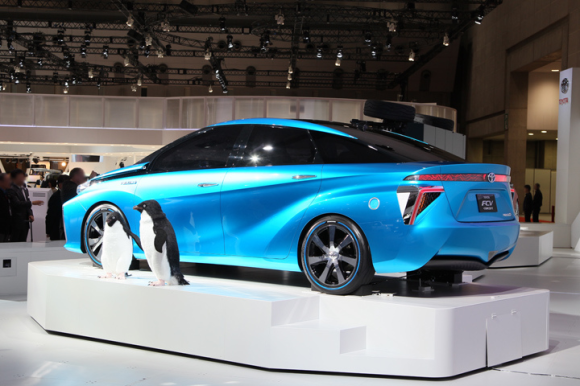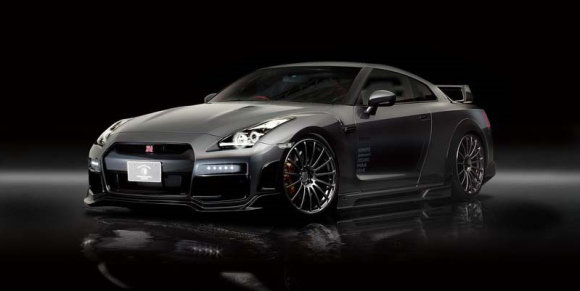
Toyota recently announced it plans to begin consumer sales of a Fuel Cell Vehicle sometime around the beginning of 2015, which has the potential to be a huge step towards a more environmentally-friendly system of personal transportation. Rival carmaker Honda isn’t about to let Japan’s largest auto manufacturer have this new field all to itself, though, as it looks to be moving ahead with plans to start selling an FCV of its own within the country that aims to be the class leader in both performance and price.
Similar to Toyota’s upcoming FCV, the new Honda will carry a supply of hydrogen which will react with oxygen drawn from the surrounding air to power the car. Initially, predictions were leaning towards Honda’s FCV being available first in the U.S. market, but recent comments from company executives indicate the current plan is to sell the car in Japan before expanding its availability to other territories.
▼ Honda’s FCV concept from 2013
Water is the only byproduct of the chemical reaction powering the FCV, resulting in the same lack of carbon dioxide emissions boasted by electric vehicles. Fuel Cell Vehicles have a couple of advantages over their all-electric counterparts, though. For starters, the hydrogen tank can be filled in about three minutes, putting FCV fueling time closer to that of gasoline-powered cars than the 20 to 30 minutes required for giving an electric vehicle a full charge.
▼ The concept version of Toyota’s soon-to-be-released Fuel Cell Vehicle
More importantly, while electric vehicles can generally run for only about 200 kilometers (124 miles) on a full charge, fuel cell vehicles are said to run in the neighborhood of 500 kilometers (310 miles). Honda claims their model will have the even more impressive capability of traveling 800 kilometers (497 miles) between hydrogen filling sessions.
Honda is hoping to make deliveries of its FCV in 2015. Pricing is yet to be set, with the carmaker expected to wait and see the reaction to Toyota’s offering which is expected to cost 9.9 million yen (US $97,100). Industry analysts estimate Honda will be able to undercut its rival and price its Fuel Cell Vehicle in the 7 to 8 million yen range ($69,000 to $78,000). Lending credibility to this prediction are statements from Honda executives that their primary goal for the new model is not to make a profit, but to help develop the FCV segment by offering a practical fuel-cell-powered car.
The final hit to buyers’ wallets might even be as low as six million yen if Honda’s FCV qualifies for the same government incentive programs that buyers of electric vehicles benefit from. This seems likely, as Prime Minister Shinzo Abe’s recently announced economic growth strategy is seeking to promote the development of fuel cell and other advanced passenger vehicles through building a more comprehensive fueling station network and grants for drivers of eco-friendly cars.
But just as Honda is seeking to cut Toyota’s time as the lone FCV provider as short as possible, other companies are also looking to enter the fuel cell arena. Rumored to be next is Nissan, the other member of Japan’s big three of auto manufacturing, who’s expected to have its own FCV ready for drivers sometime in 2017.
▼ We’re keeping our fingers crossed that it’s a zero-emission R36 GT-R.
Source: Huffington Post
Top image: YouTube/Honda
Insert images: YouTube/Honda, Toyota, Tommy Kaira




 Toyota’s hydrogen fuel cell powered car ready for sale this December
Toyota’s hydrogen fuel cell powered car ready for sale this December Japan’s hydrogen fuel cell stations begin to open, but are they worth the switch?
Japan’s hydrogen fuel cell stations begin to open, but are they worth the switch? New king of hybrids: Honda’s new Fit Hybrid to boast a 85.6 mpg fuel efficiency level
New king of hybrids: Honda’s new Fit Hybrid to boast a 85.6 mpg fuel efficiency level Breathe easy – Toyota redesigning Prius plug-in hybrid to double car’s all-electric range
Breathe easy – Toyota redesigning Prius plug-in hybrid to double car’s all-electric range Tokyo Motor Show 2013: Cars! Crowds! Comely models! 【Photos】
Tokyo Motor Show 2013: Cars! Crowds! Comely models! 【Photos】 Which convenience store onigiri rice balls are the most popular? Survey reveals surprising results
Which convenience store onigiri rice balls are the most popular? Survey reveals surprising results Tokyo street sweets: The must-snack treats of Nakano’s Refutei
Tokyo street sweets: The must-snack treats of Nakano’s Refutei Drift ice in Japan is a disappearing winter miracle you need to see now
Drift ice in Japan is a disappearing winter miracle you need to see now As more foreign visitors visit Kyoto’s top sights, Japanese travelers increasingly staying away
As more foreign visitors visit Kyoto’s top sights, Japanese travelers increasingly staying away We find the best “homestyle” onigiri at a super local chain of convenience stores
We find the best “homestyle” onigiri at a super local chain of convenience stores Is Sapporio’s Snow Festival awesome enough to be worth visiting even if you hate the snow? [Pics]
Is Sapporio’s Snow Festival awesome enough to be worth visiting even if you hate the snow? [Pics] New Mochi Cream Doughnuts from Mister Donut pay homage to Japanese confectionery
New Mochi Cream Doughnuts from Mister Donut pay homage to Japanese confectionery Demon Slayer anime restaurant coming to Universal Studios with Hashira meals, life-size figures
Demon Slayer anime restaurant coming to Universal Studios with Hashira meals, life-size figures What do Japanese People Put in Their Rice Balls? Top 22 Most Popular Onigiri Fillings!
What do Japanese People Put in Their Rice Balls? Top 22 Most Popular Onigiri Fillings! Jamiroquai doll from Japan lets you control your own Virtual Insanity 【Video】
Jamiroquai doll from Japan lets you control your own Virtual Insanity 【Video】 Highest Starbucks in Japan set to open this spring in the Tokyo sky
Highest Starbucks in Japan set to open this spring in the Tokyo sky Starbucks Japan releases first-ever Hinamatsuri Girls’ Day Frappuccino
Starbucks Japan releases first-ever Hinamatsuri Girls’ Day Frappuccino The 10 most annoying things foreign tourists do on Japanese trains, according to locals
The 10 most annoying things foreign tourists do on Japanese trains, according to locals Tokyo Skytree turns pink for the cherry blossom season
Tokyo Skytree turns pink for the cherry blossom season Yakuzen ramen restaurant in Tokyo is very different to a yakuza ramen restaurant
Yakuzen ramen restaurant in Tokyo is very different to a yakuza ramen restaurant Shibuya Station’s Hachiko Gate and Yamanote Line stairway locations change next month
Shibuya Station’s Hachiko Gate and Yamanote Line stairway locations change next month Starbucks Japan releases new sakura goods and drinkware for cherry blossom season 2026
Starbucks Japan releases new sakura goods and drinkware for cherry blossom season 2026 Starbucks Japan adds new sakura Frappuccino and cherry blossom drinks to the menu
Starbucks Japan adds new sakura Frappuccino and cherry blossom drinks to the menu Japan Extreme Budget Travel! A trip from Tokyo to Izumo for just 30,000 yen [Part 1]
Japan Extreme Budget Travel! A trip from Tokyo to Izumo for just 30,000 yen [Part 1] Japan’s new “Cunte” contact lenses aren’t pronounced like you’re probably thinking they are
Japan’s new “Cunte” contact lenses aren’t pronounced like you’re probably thinking they are Japan’s newest Shinkansen has no seats…or passengers [Video]
Japan’s newest Shinkansen has no seats…or passengers [Video] Foreigners accounting for over 80 percent of off-course skiers needing rescue in Japan’s Hokkaido
Foreigners accounting for over 80 percent of off-course skiers needing rescue in Japan’s Hokkaido Super-salty pizza sends six kids to the hospital in Japan, linguistics blamed
Super-salty pizza sends six kids to the hospital in Japan, linguistics blamed Starbucks Japan unveils new sakura Frappuccino for cherry blossom season 2026
Starbucks Japan unveils new sakura Frappuccino for cherry blossom season 2026 Foreign tourists in Japan will get free Shinkansen tickets to promote regional tourism
Foreign tourists in Japan will get free Shinkansen tickets to promote regional tourism Take a trip to Japan’s Dododo Land, the most irritating place on Earth
Take a trip to Japan’s Dododo Land, the most irritating place on Earth Naruto and Converse team up for new line of shinobi sneakers[Photos]
Naruto and Converse team up for new line of shinobi sneakers[Photos] Is China’s don’t-go-to-Japan warning affecting the lines at a popular Tokyo gyukatsu restaurant?
Is China’s don’t-go-to-Japan warning affecting the lines at a popular Tokyo gyukatsu restaurant? Survey asks foreign tourists what bothered them in Japan, more than half gave same answer
Survey asks foreign tourists what bothered them in Japan, more than half gave same answer Japan’s human washing machines will go on sale to general public, demos to be held in Tokyo
Japan’s human washing machines will go on sale to general public, demos to be held in Tokyo Starbucks Japan releases new drinkware and goods for Valentine’s Day
Starbucks Japan releases new drinkware and goods for Valentine’s Day We deeply regret going into this tunnel on our walk in the mountains of Japan
We deeply regret going into this tunnel on our walk in the mountains of Japan Studio Ghibli releases Kodama forest spirits from Princess Mononoke to light up your home
Studio Ghibli releases Kodama forest spirits from Princess Mononoke to light up your home Major Japanese hotel chain says reservations via overseas booking sites may not be valid
Major Japanese hotel chain says reservations via overseas booking sites may not be valid Put sesame oil in your coffee? Japanese maker says it’s the best way to start your day【Taste test】
Put sesame oil in your coffee? Japanese maker says it’s the best way to start your day【Taste test】 No more using real katana for tourism activities, Japan’s National Police Agency says
No more using real katana for tourism activities, Japan’s National Police Agency says Exhibit of globally popular ’80s and ’90s Japanese cars comes to Toyota Automobile Museum
Exhibit of globally popular ’80s and ’90s Japanese cars comes to Toyota Automobile Museum Real-world Koraidon and Miraidon Pokémon are ready for their close-ups【Photos】
Real-world Koraidon and Miraidon Pokémon are ready for their close-ups【Photos】